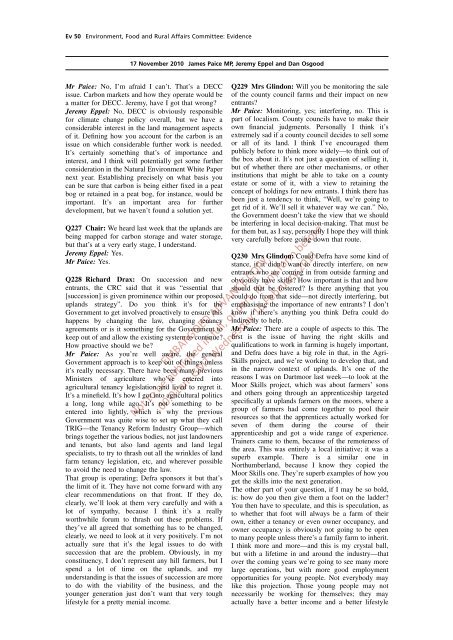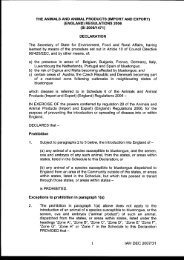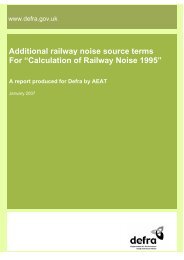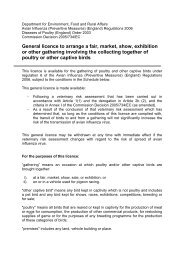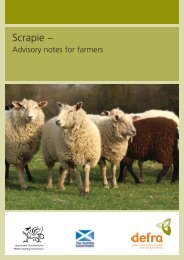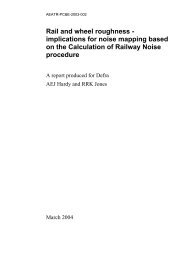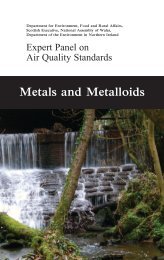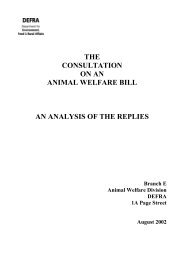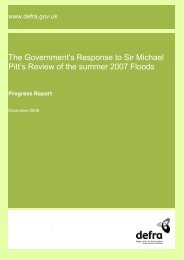Farming in the Uplands - ARCHIVE: Defra
Farming in the Uplands - ARCHIVE: Defra
Farming in the Uplands - ARCHIVE: Defra
Create successful ePaper yourself
Turn your PDF publications into a flip-book with our unique Google optimized e-Paper software.
Ev 50 Environment, Food and Rural Affairs Committee: Evidence<br />
17 November 2010 James Paice MP, Jeremy Eppel and Dan Osgood<br />
Mr Paice: No, I’m afraid I can’t. That’s a DECC<br />
issue. Carbon markets and how <strong>the</strong>y operate would be<br />
a matter for DECC. Jeremy, have I got that wrong?<br />
Jeremy Eppel: No, DECC is obviously responsible<br />
for climate change policy overall, but we have a<br />
considerable <strong>in</strong>terest <strong>in</strong> <strong>the</strong> land management aspects<br />
of it. Def<strong>in</strong><strong>in</strong>g how you account for <strong>the</strong> carbon is an<br />
issue on which considerable fur<strong>the</strong>r work is needed.<br />
It’s certa<strong>in</strong>ly someth<strong>in</strong>g that’s of importance and<br />
<strong>in</strong>terest, and I th<strong>in</strong>k will potentially get some fur<strong>the</strong>r<br />
consideration <strong>in</strong> <strong>the</strong> Natural Environment White Paper<br />
next year. Establish<strong>in</strong>g precisely on what basis you<br />
can be sure that carbon is be<strong>in</strong>g ei<strong>the</strong>r fixed <strong>in</strong> a peat<br />
bog or reta<strong>in</strong>ed <strong>in</strong> a peat bog, for <strong>in</strong>stance, would be<br />
important. It’s an important area for fur<strong>the</strong>r<br />
development, but we haven’t found a solution yet.<br />
Q227 Chair: We heard last week that <strong>the</strong> uplands are<br />
be<strong>in</strong>g mapped for carbon storage and water storage,<br />
but that’s at a very early stage, I understand.<br />
Jeremy Eppel: Yes.<br />
Mr Paice: Yes.<br />
Q228 Richard Drax: On succession and new<br />
entrants, <strong>the</strong> CRC said that it was “essential that<br />
[succession] is given prom<strong>in</strong>ence with<strong>in</strong> our proposed<br />
uplands strategy”. Do you th<strong>in</strong>k it’s for <strong>the</strong><br />
Government to get <strong>in</strong>volved proactively to ensure this<br />
happens by chang<strong>in</strong>g <strong>the</strong> law, chang<strong>in</strong>g tenancy<br />
agreements or is it someth<strong>in</strong>g for <strong>the</strong> Government to<br />
keep out of and allow <strong>the</strong> exist<strong>in</strong>g system to cont<strong>in</strong>ue?<br />
How proactive should we be?<br />
Mr Paice: As you’re well aware, <strong>the</strong> general<br />
Government approach is to keep out of th<strong>in</strong>gs unless<br />
it’s really necessary. There have been many previous<br />
M<strong>in</strong>isters of agriculture who’ve entered <strong>in</strong>to<br />
agricultural tenancy legislation and lived to regret it.<br />
It’s a m<strong>in</strong>efield. It’s how I got <strong>in</strong>to agricultural politics<br />
a long, long while ago. It’s not someth<strong>in</strong>g to be<br />
entered <strong>in</strong>to lightly, which is why <strong>the</strong> previous<br />
Government was quite wise to set up what <strong>the</strong>y call<br />
TRIG—<strong>the</strong> Tenancy Reform Industry Group—which<br />
br<strong>in</strong>gs toge<strong>the</strong>r <strong>the</strong> various bodies, not just landowners<br />
and tenants, but also land agents and land legal<br />
specialists, to try to thrash out all <strong>the</strong> wr<strong>in</strong>kles of land<br />
farm tenancy legislation, etc, and wherever possible<br />
to avoid <strong>the</strong> need to change <strong>the</strong> law.<br />
That group is operat<strong>in</strong>g; <strong>Defra</strong> sponsors it but that’s<br />
<strong>the</strong> limit of it. They have not come forward with any<br />
clear recommendations on that front. If <strong>the</strong>y do,<br />
clearly, we’ll look at <strong>the</strong>m very carefully and with a<br />
lot of sympathy, because I th<strong>in</strong>k it’s a really<br />
worthwhile forum to thrash out <strong>the</strong>se problems. If<br />
<strong>the</strong>y’ve all agreed that someth<strong>in</strong>g has to be changed,<br />
clearly, we need to look at it very positively. I’m not<br />
actually sure that it’s <strong>the</strong> legal issues to do with<br />
succession that are <strong>the</strong> problem. Obviously, <strong>in</strong> my<br />
constituency, I don’t represent any hill farmers, but I<br />
spend a lot of time on <strong>the</strong> uplands, and my<br />
understand<strong>in</strong>g is that <strong>the</strong> issues of succession are more<br />
to do with <strong>the</strong> viability of <strong>the</strong> bus<strong>in</strong>ess, and <strong>the</strong><br />
younger generation just don’t want that very tough<br />
lifestyle for a pretty menial <strong>in</strong>come.<br />
Q229 Mrs Gl<strong>in</strong>don: Will you be monitor<strong>in</strong>g <strong>the</strong> sale<br />
of <strong>the</strong> county council farms and <strong>the</strong>ir impact on new<br />
entrants?<br />
Mr Paice: Monitor<strong>in</strong>g, yes; <strong>in</strong>terfer<strong>in</strong>g, no. This is<br />
part of localism. County councils have to make <strong>the</strong>ir<br />
own f<strong>in</strong>ancial judgments. Personally I th<strong>in</strong>k it’s<br />
extremely sad if a county council decides to sell some<br />
or all of its land. I th<strong>in</strong>k I’ve encouraged <strong>the</strong>m<br />
publicly before to th<strong>in</strong>k more widely—to th<strong>in</strong>k out of<br />
<strong>the</strong> box about it. It’s not just a question of sell<strong>in</strong>g it,<br />
but of whe<strong>the</strong>r <strong>the</strong>re are o<strong>the</strong>r mechanisms, or o<strong>the</strong>r<br />
<strong>in</strong>stitutions that might be able to take on a county<br />
estate or some of it, with a view to reta<strong>in</strong><strong>in</strong>g <strong>the</strong><br />
concept of hold<strong>in</strong>gs for new entrants. I th<strong>in</strong>k <strong>the</strong>re has<br />
been just a tendency to th<strong>in</strong>k, “Well, we’re go<strong>in</strong>g to<br />
get rid of it. We’ll sell it whatever way we can.” No,<br />
<strong>the</strong> Government doesn’t take <strong>the</strong> view that we should<br />
be <strong>in</strong>terfer<strong>in</strong>g <strong>in</strong> local decision-mak<strong>in</strong>g. That must be<br />
for <strong>the</strong>m but, as I say, personally I hope <strong>the</strong>y will th<strong>in</strong>k<br />
very carefully before go<strong>in</strong>g down that route.<br />
Q230 Mrs Gl<strong>in</strong>don: Could <strong>Defra</strong> have some k<strong>in</strong>d of<br />
stance, if it didn’t want to directly <strong>in</strong>terfere, on new<br />
entrants who are com<strong>in</strong>g <strong>in</strong> from outside farm<strong>in</strong>g and<br />
obviously have skills? How important is that and how<br />
should that be fostered? Is <strong>the</strong>re anyth<strong>in</strong>g that you<br />
could do from that side—not directly <strong>in</strong>terfer<strong>in</strong>g, but<br />
emphasis<strong>in</strong>g <strong>the</strong> importance of new entrants? I don’t<br />
know if <strong>the</strong>re’s anyth<strong>in</strong>g you th<strong>in</strong>k <strong>Defra</strong> could do<br />
<strong>in</strong>directly to help.<br />
Mr Paice: There are a couple of aspects to this. The<br />
first is <strong>the</strong> issue of hav<strong>in</strong>g <strong>the</strong> right skills and<br />
qualifications to work <strong>in</strong> farm<strong>in</strong>g is hugely important,<br />
and <strong>Defra</strong> does have a big role <strong>in</strong> that, <strong>in</strong> <strong>the</strong> Agri-<br />
Skills project, and we’re work<strong>in</strong>g to develop that, and<br />
<strong>in</strong> <strong>the</strong> narrow context of uplands. It’s one of <strong>the</strong><br />
reasons I was on Dartmoor last week—to look at <strong>the</strong><br />
Moor Skills project, which was about farmers’ sons<br />
and o<strong>the</strong>rs go<strong>in</strong>g through an apprenticeship targeted<br />
specifically at uplands farmers on <strong>the</strong> moors, where a<br />
group of farmers had come toge<strong>the</strong>r to pool <strong>the</strong>ir<br />
resources so that <strong>the</strong> apprentices actually worked for<br />
seven of <strong>the</strong>m dur<strong>in</strong>g <strong>the</strong> course of <strong>the</strong>ir<br />
apprenticeship and got a wide range of experience.<br />
Tra<strong>in</strong>ers came to <strong>the</strong>m, because of <strong>the</strong> remoteness of<br />
<strong>the</strong> area. This was entirely a local <strong>in</strong>itiative; it was a<br />
superb example. There is a similar one <strong>in</strong><br />
Northumberland, because I know <strong>the</strong>y copied <strong>the</strong><br />
Moor Skills one. They’re superb examples of how you<br />
get <strong>the</strong> skills <strong>in</strong>to <strong>the</strong> next generation.<br />
The o<strong>the</strong>r part of your question, if I may be so bold,<br />
is: how do you <strong>the</strong>n give <strong>the</strong>m a foot on <strong>the</strong> ladder?<br />
You <strong>the</strong>n have to speculate, and this is speculation, as<br />
to whe<strong>the</strong>r that foot will always be a farm of <strong>the</strong>ir<br />
own, ei<strong>the</strong>r a tenancy or even owner occupancy, and<br />
owner occupancy is obviously not go<strong>in</strong>g to be open<br />
to many people unless <strong>the</strong>re’s a family farm to <strong>in</strong>herit.<br />
I th<strong>in</strong>k more and more—and this is my crystal ball,<br />
but with a lifetime <strong>in</strong> and around <strong>the</strong> <strong>in</strong>dustry—that<br />
over <strong>the</strong> com<strong>in</strong>g years we’re go<strong>in</strong>g to see many more<br />
large operations, but with more good employment<br />
opportunities for young people. Not everybody may<br />
like this projection. Those young people may not<br />
necessarily be work<strong>in</strong>g for <strong>the</strong>mselves; <strong>the</strong>y may<br />
actually have a better <strong>in</strong>come and a better lifestyle<br />
EMBARGOED ADVANCE COPY:<br />
Not to be published <strong>in</strong> full, or part, <strong>in</strong> any form before<br />
00.01am GMT Wednesday 16 February 2011


